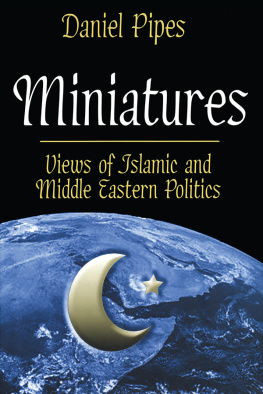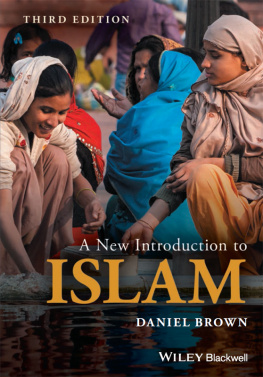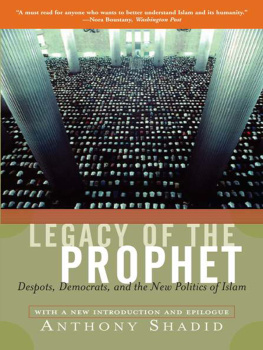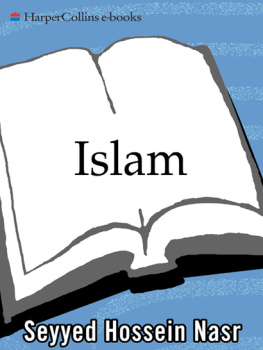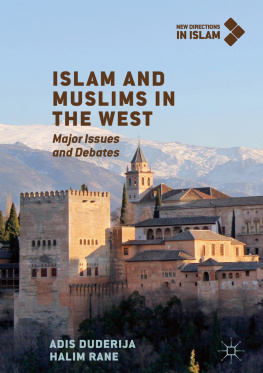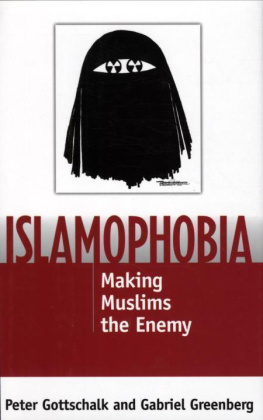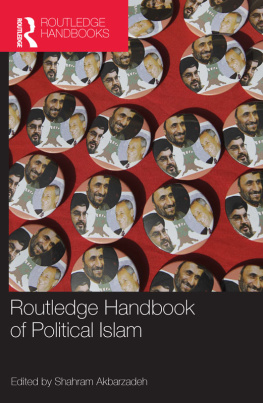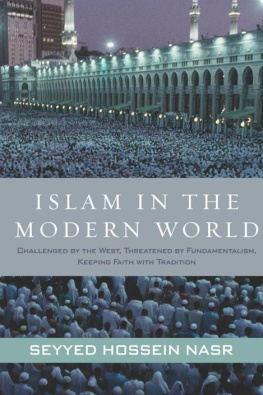Originally published in 1983 by Basic Books, Inc.
Published 2002 by Transaction Publishers
Published 2017 by Routledge
2 Park Square, Milton Park, Abingdon, Oxon 0X14 4RN
711 Third Avenue, New York, NY 10017, USA
Routledge is an imprint of the Taylor & Francis Group, an informa business
New material this edition copyright 2002 by Taylor & Francis.
The author gratefully acknowledges the National Committee to Honor the Fourteenth Centennial of Islam for the map ( 1980) on page 19; and Olivier Carre, Presses Universitaires de France for the map ( 1980) on page 20.
All rights reserved. No part of this book may be reprinted or reproduced or utihsed in any form or by any electronic, mechanical, or other means, now known or hereafter invented, including photocopying and recording, or in any information storage or retrieval system, without permission in writing from the pubhshers.
Notice: Product or corporate names may be trademarks or registered trademarks, and are used only for identification and explanation without intent to infringe.
Library of Congress Catalog Number: 2002068499
Library of Congress Cataloging-in-Publication Data
Pipes, Daniel, 1949
In the path of God : Islam and political power/Daniel Pipes ; with a new
preface by the author,
p. cm.
Includes bibliographical references and index.
ISBN 0-7658-0981-8 (paper.: alk. paper)
1. Islam and politics, 2. Islam20th century. 3. Islamic countriesRelationsEurope. 4. EuropeRelationsIslamic countries. I. Title.
BP173.7 .P56 2002
320.55dc21
2002068499
ISBN 13: 978-0-7658-0981-0 (pbk)
AS THE attention of Americans abruptly focused on Islam and Muslims in the aftermath of September 11, 2001, to many in the United States this felt like an unprecedented turn of events. But Islam and Muslims had dominated American public life once before, during the period of the Iranian revolution and the U.S. embassy hostage crisis, from 1979 to 1981. On both occasions, Americans found themselves targeted by peoples they had thought of as basically friendly (Iranians then, Saudis now), for reasons stemming from a militant interpretation of Islam (Khomeinist, Wahhabi). In both episodes, Americans were stunned by the hatred felt for them among some Muslims (Death to America, I pray to Allah [for] the destruction of the United States of America).
I wrote In the Path of God in response to that first heightened interest in Islam. My goal was to present an overview of the connection between Islam and political power throughout fourteen centuries, and to do so in a way that would help explain the origins of that crisis. Because the issues then in important ways resemble those discussed today, I am very pleased that Transaction Publishers is again making In the Path of God available.
How has the book stood up since its original publication in 1983? The first two sections, being historical in nature, have done well, confirmed both by more recent experience and by research into the past, No subsequent analysis of Islam in history has remotely the same outlook or conclusions as this one; I believe that these two sections contain some of the most original and important writing of my career.
In contrast, the third section, Islam in Current Affairs, can only be read today for an understanding of how things looked when the Islamic revival, as it was then known, was yet in its preliminary stages. This section begins with a novel attempt at a country-by-country review of the entire Muslim world and then addresses the burning issue of that time: Whence the Islamic revival? I made the case that fundamentalist Islam (now most commonly called militant Islam) was surging because of the Muslim economic gains from oil and gas revenues.
Although the survey of countries still provides a useful, if dated, outline of Islams circumstances around the world, I no longer argue for the tight connection between oil and Islam found in In the Path of God. I did establish that oil revenues helped give militant Islam a start; but once up and running, I accept that it no longer depends on this financial boostas shown by oil revenues having several times in the intervening years gone down without a noticeable reduction in militant Islams steady gains. That said, oil revenues certainly do enhance militant Islams stature and reach, as even its supporters acknowledge.
More basically, I no longer try to account for the rise in militant Islam with a single explanation, finding that this phenomenon is too complex for such monocausality. Rather, I see it resulting from the interaction of identity and circumstance. The Muslim world feels something has gone very wrong, but has been frustrated in its attempts to right matters. The attraction to militant Islam manifests that frustration.
I urge the reader to focus on the first two sections of this book which offer a still-rare attempt at a cohesive interpretation of Islam in politics; the third section serves mostly to see how things looked at the start of militant Islams recent surge.
Ideally, I would like to have replaced the third section with an entirely new essay. A brief preface can hardly substitute for over a hundred pages, so the interested reader is urged to look up my writings on this topic, found most conveniently in my book Militant Islam Reaches America (Norton, 2002). Here I can just note some of the evolution concerning Islam and politics over the past two decades and then record my changed views.
The debate over causes of the Islamic surge has become less important. That surge is nearly thirty years old and has become an enduring part of the landscape. To the extent that its causes are still questioned, the conventional wisdom has shifted: it used to point to Israels military victory of 1967 and the failure of alternate ideologies; now, the usual culprit is economic backwardness and political repression. This change marks an improvement but still it misses the depth and the global nature of the causes, which lie deep in questions of identity and standing. This explains how militant Islam so commonly attracts Muslims who are neither poor nor repressed.
Militant Islam has evolved from the primitive impulses of Muammar al-Qadhdhafi and the revolutionarism of Ayatollah Ruhollah Khomeini to the savvy efforts of leaders like Rashid al-Ghannushi of Tunisia and Hasan at-Turabi of Sudan. What was raw and vague is now refined and targeted. Qadhdhafi (a military officer) and Khomeini (a member of the ulama) have been overtaken by more sophisticated and media-savvy thinkers and operators who can convincingly speak the language of democracy and reform.
In 1983, militant Islam was primarily a Middle Eastern phenomenon; by now it has spread to many other regions, including West Africa, the Balkans, and Southeast Asia. Countries relatively untouched then, like Algeria, Nigeria, Bangladesh, and Indonesia, are today grappling with the full import of militant Islam.


